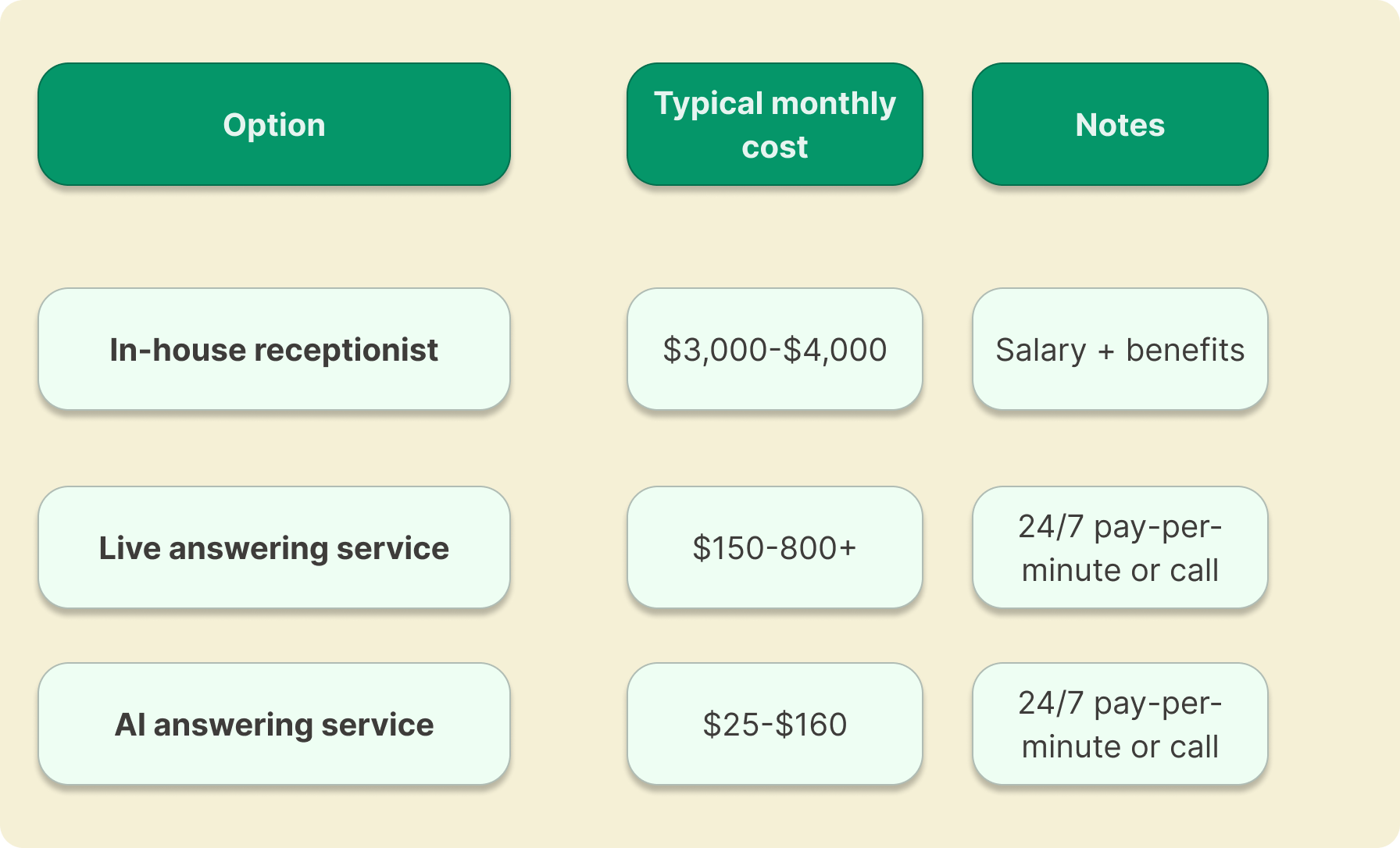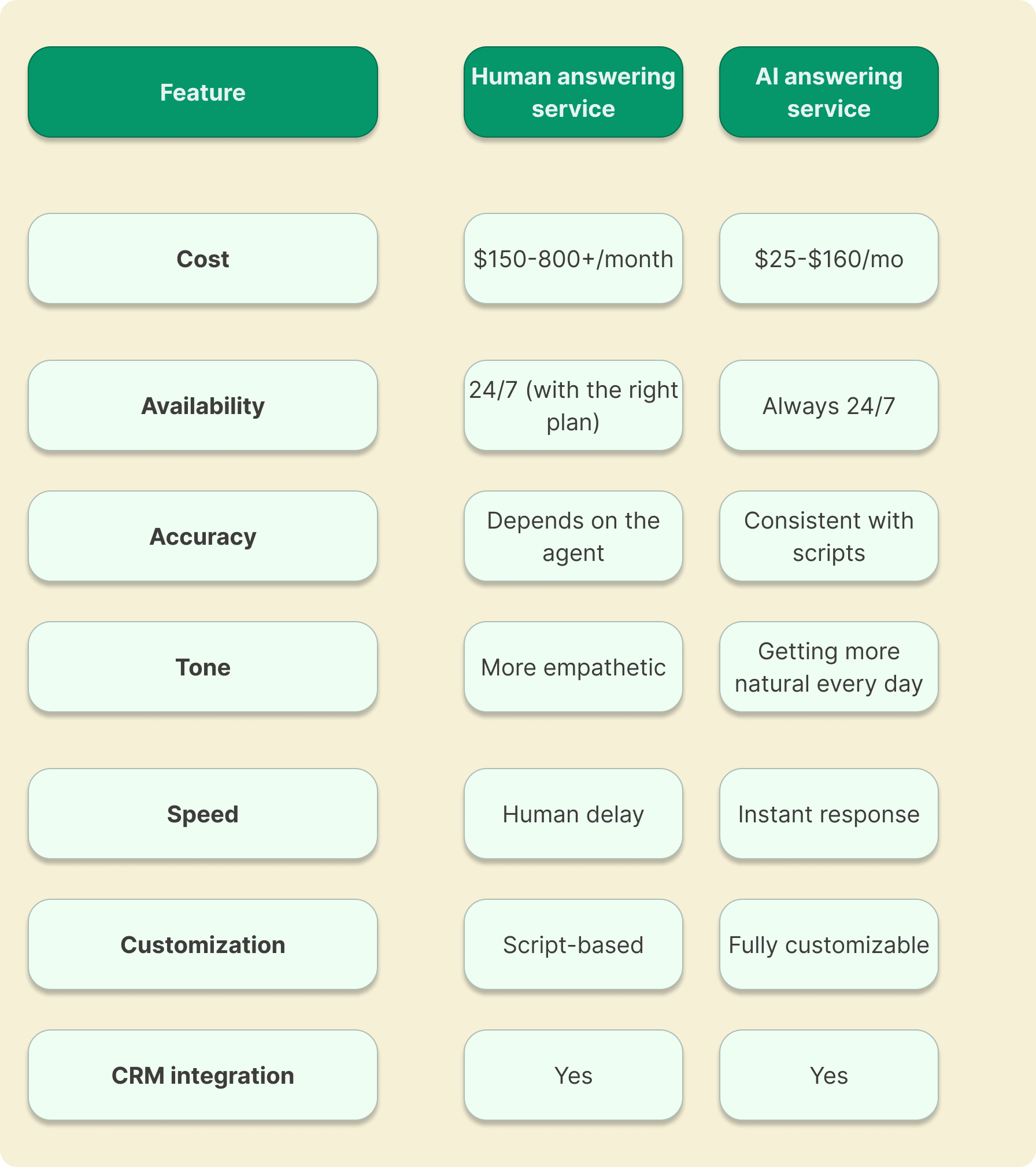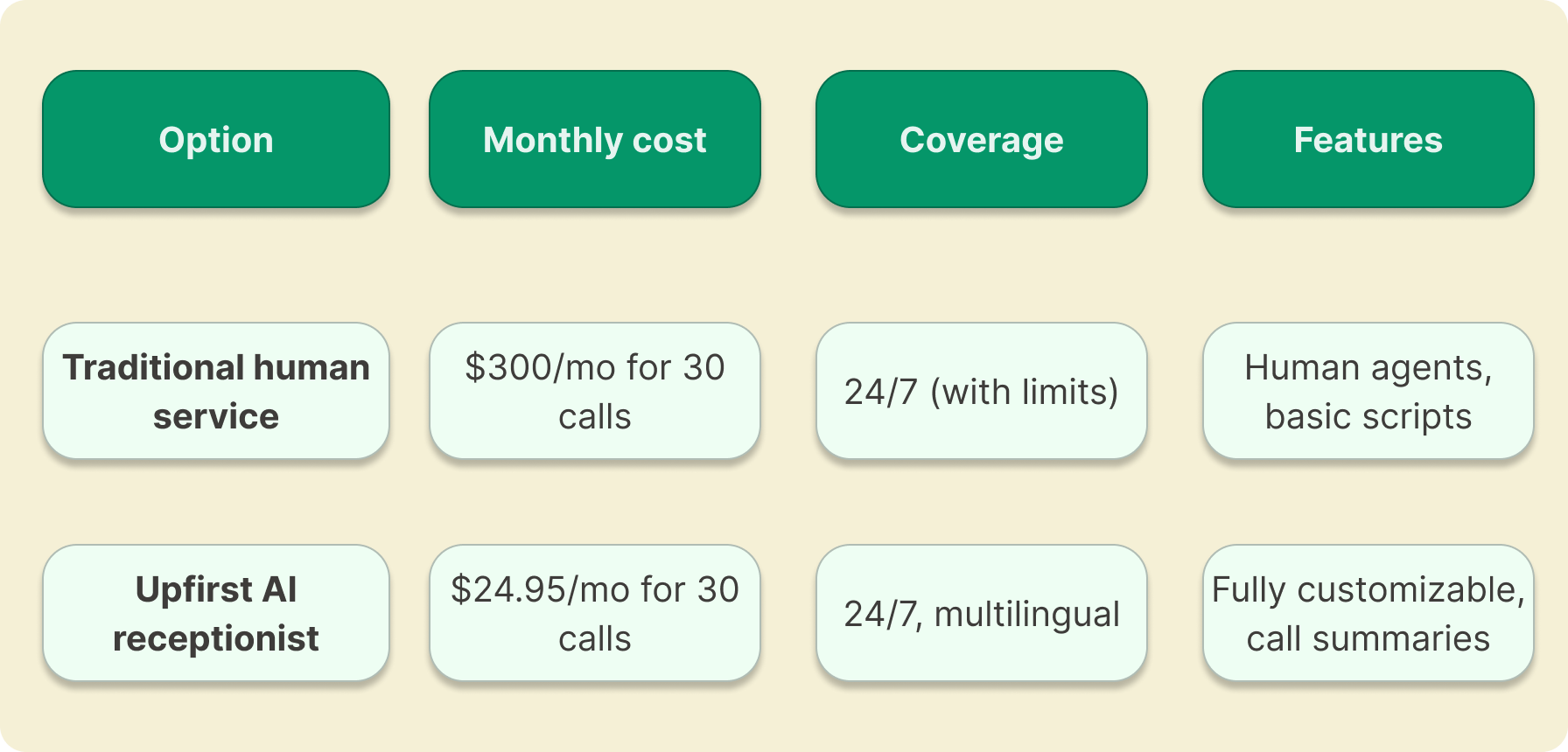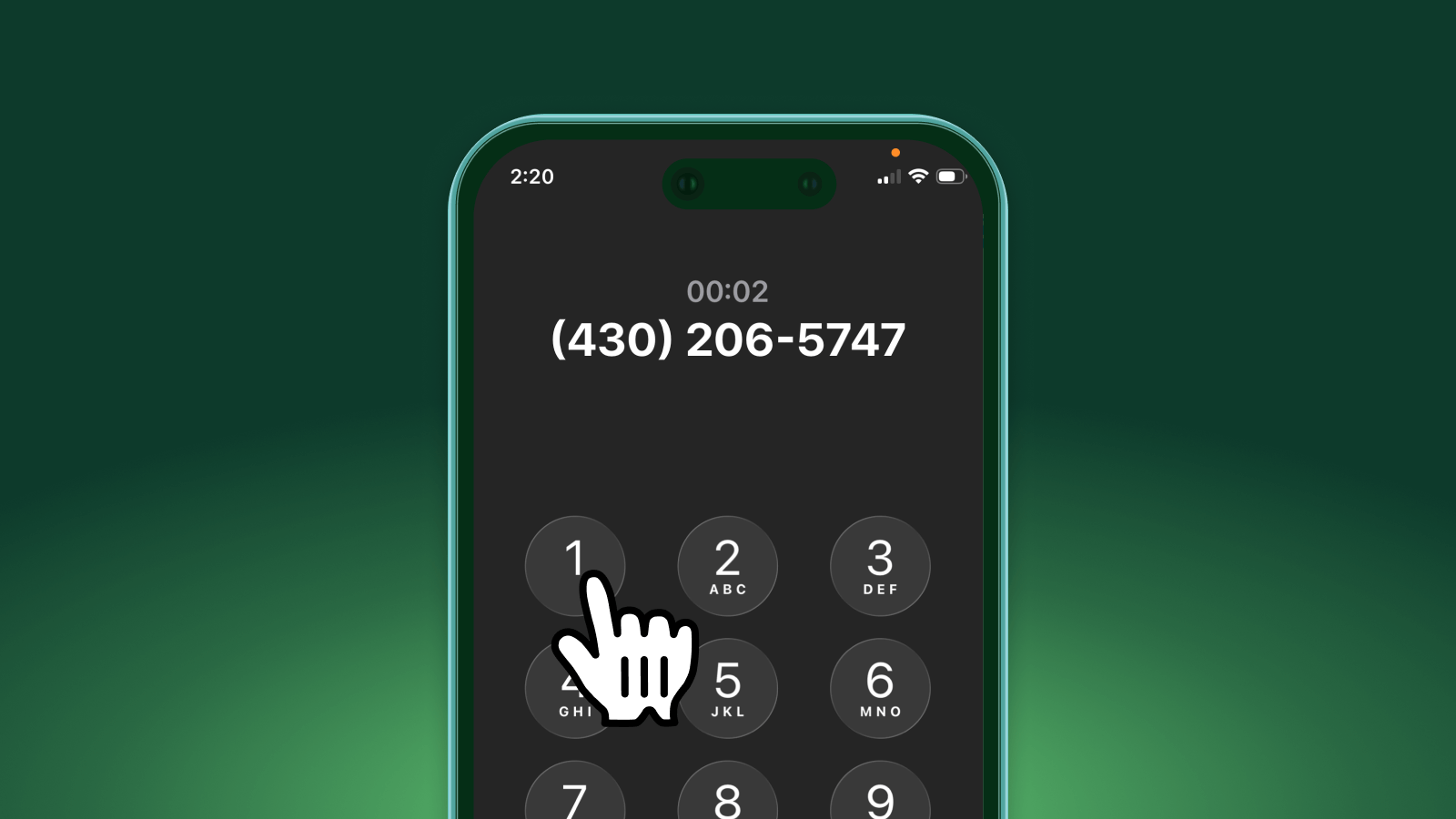- An answering service helps small businesses capture missed calls, improve customer experience, and manage their time.
- Whether it’s worth it depends on your call volume, budget, and how often you miss customer inquiries.
- With rising costs for live services, affordable AI options like Upfirst now make 24/7 call coverage accessible to any small business.
If you run a small business, you know how hectic things can get. Add a phone that won't stop ringing on top of that? It's hard to manage everything by yourself. Maybe you’re with a customer, out on a job, or wearing three hats at once. The phone goes to voicemail, you promise yourself you’ll call back, but life gets in the way. By the time you finally have a chance, that potential customer has probably already moved on.
You'll hear this on every other blog in this industry, but missed calls do mean missed business. But hiring a full-time receptionist can be expensive, and no one wants to be on call all day, every day.
So, is an answering service worth it for your business?
The short answer: For many small businesses, yes—if you choose the right service, it can pay for itself and then some.
Let’s walk through what answering services do, how much they cost, and how to know if they’re the right fit for you.
What is an answering service?
An answering service is a team or software that steps in to handle your calls when you can’t get to the phone. Depending on what you pick, they can:
- Take messages and deliver them to you
- Transfer important calls to the right person
- Schedule appointments in your calendar
- Answer common customer questions
- Route urgent calls
- Handle after-hours answering service or weekend calls
There are a few main types:
- Live answering services – Real people answer your calls, usually from a call center.
- AI answering services – AI virtual receptionists handle conversations automatically using scripts, prompts, and your business info.
- Hybrid services – AI takes care of routine calls, while humans step in for more complicated or sensitive situations.
This isn’t the same as a small business call center (which usually handles massive call volumes) or a virtual assistant (who helps with admin work). Answering services are all about making sure your business never misses a customer call and always sounds professional.
The true cost of an answering service
Answering services are often more affordable than you might think, but prices and plans can vary. Here’s how most charge:
- Per minute: Pay for the time spent on the phone (often $0.75–$1.50+ per minute).
- Per call: Some services charge a flat rate for each call answered.
- Monthly plans: Packages for small businesses usually start between $100 and $400 per month, and allow a certain amount of minutes or calls per month.
Keep an eye out for extra fees, like setup charges, after-hours rates, or overage fees if you get more calls than your plan covers.
Here’s a quick look at the costs side-by-side:

✅ The benefits—when it’s worth it
So, what do you actually get by having someone else answer your phone?
1. Never miss a lead
Every missed call is a customer who might not call back. Answering services make sure every call is picked up, which means more chances to win new business.
2. Always available, day or night
People call when it’s convenient for them, not just during business hours. An answering service makes your business reachable 24/7, giving you an edge over competitors.
3. Look more professional
A friendly, knowledgeable voice shows customers you’re organized and reliable.
4. Less stress for your team
Your staff can focus on their main jobs without constant interruptions from the phone.
5. Handle seasonal spikes easily
Busy season? No need to rush out and hire extra help. You can scale your answering service up or down as needed. A great option for overflow reception.
6. Grows with your business
As your company expands, your answering service can take on more calls, taking the pressure off a phone line that's getting busier and busier.
7. Peace of mind
You don’t have to worry about missing that big call while you’re in a meeting or on a job.
8. More time for what matters
With calls handled, you can focus on running and growing your business instead of being tied to the phone.
Did you know? Up to 85% of callers who don’t reach a live person don’t call back. Answering every call can make a real difference to your bottom line.
⚠️ The drawbacks—when it might not be worth it
Answering services aren’t perfect for every business. Here are a few things to consider:
1. Less of a personal touch
The person answering might not know your customers by name or understand your business as well as you do.
2. Less control over every call
You’re trusting someone else to make a good first impression for your business.
3. Not everyone cares like you do
Sometimes, service agents (especially at big companies) hurry through calls or miss the little details that matter. Not every agent will put the same care and attention into a call like someone at your company would.
4. Service quality can vary
This is one I hear all the time from our clients: some businesses report issues with agents being unfriendly or not following instructions, which looks bad on your image and reputation.
5. Limited product knowledge
Unless you spend time training the service, they might not be able to answer detailed questions.
6. Contracts and extra fees
Some providers lock you into long contracts or charge extra for things like custom greetings or message delivery.
7. Low call volume, low value
If you only get a few calls a week, you might not see enough benefit to justify the cost.
💡 Reality check: An answering service is most valuable if you’re missing calls regularly or need coverage outside normal hours.
How to decide if it’s worth it for your business
Here’s a simple checklist to help you figure it out:
- Are you missing 10 or more calls a week?
- Are customers complaining about slow or no response?
- Is your team too busy to answer every call?
- Do calls come in after hours or on weekends?
If you answered “yes” to two or more, an answering service could easily pay for itself.
Quick cost-benefit example
Let’s say:
- Each new customer is worth $200
- Your answering service costs $150 per month
You only need one extra customer a month to cover the cost. Everything else is profit, and you get less stress and happier customers.
AI vs. human answering services
Should you choose a real person or an AI receptionist?

Human services are a great fit when empathy and personal touch are essential, like in healthcare. But for most everyday calls, AI services can now handle 80–99% of questions, scheduling, and call routing just as well.
Hybrid models (AI for routine calls, humans for the complex ones) give you the best of both worlds.
How to choose the right service
Ready to explore your options? Here’s what to look for:
- Custom scripts: The service should sound like it’s really a part of your business.
- Integrations: Look for services that work with your calendar or CRM.
- Multilingual support: Helpful if you have a diverse customer base.
- Simple pricing: Watch out for hidden fees or complicated contracts.
- Easy-to-read reports: So you can track call volume and missed calls at a glance.
- Room to grow: Make sure you can upgrade your plan as you get busier.
And don’t forget to steer clear of long-term contracts or unclear pricing. Most reputable providers let you try before you commit with free trials or month-to-month options.
Why more small businesses are choosing AI answering services
Traditional live answering services are getting pricey. Many now charge $1–$2 per minute and require you to commit to $300–$500 per month just to get started. Add in extra charges for after-hours or bilingual support, and it really adds up.
For a small business, that can be tough to justify, especially if your call volume isn’t huge.
That’s why more companies are switching to AI answering services like Upfirst.
You get all the major benefits: 24/7 coverage, message taking, appointment scheduling, and call routing—all for a fraction of the price of traditional answering services. There are no per-minute charges, no setup fees, and no long-term contracts.
Here’s a quick comparison:

For startups, local contractors, and small offices, this makes having a professional receptionist finally affordable again.
See what our customers are saying about using an AI virtual receptionist from Upfirst.
The bottom line: is an answering service worth it?
So, is an answering service worth it for small businesses?
For most, yes, especially if you’re missing calls, handling too many tasks, or want your business to sound more professional. Even a small investment can pay off quickly.
Just remember, not all services are equal. Traditional live services are still out there, but new AI-powered options like Upfirst deliver the same results for much less.
The best way to know if it’s right for you? Give it a try.
Do the math. Figure out how many calls you miss each month and what those calls are worth. If saving even one customer covers the cost, you have your answer.
Ready to stop missing calls for your business and get an affordable receptionist?
👉 Try Upfirst free today and see how easy it is to make sure every call is answered, without going over your budget.
Nick Lau is a copywriter and content lead for Upfirst.ai. A self-starter at heart, he dove into marketing in 2015 by launching an e-commerce company, selling private-labeled products on Amazon and Shopify. When he’s not crafting copy, you might spot him on a winding road trip to the coasts or through forests, in search of unexplored places.








